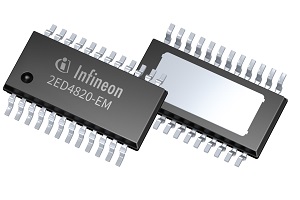Automotive dual high-side gate driver EiceDRIVER 2ED4820-EM with SPI protects dependable 48 V battery systems

Electrical Vehicles, trucks, e-wheelers and battery packs for solar panels. These Li-ion battery systems need to be protected against negative and positive voltages. In addition, these batteries must be able to quickly and reliably disconnect from loads within microseconds, in the event of an overcurrent. Since a battery unit may not be dedicated to one vehicle, status diagnostic and protection threshold configurability are key.
To address these requirements, Infineon Technologies AG introduces the EiceDRIVER 2ED4820-EM, a smart gate driver with SPI interface. The gate driver is an ideal companion to Infineon’s 80/100 V OptiMOS MOSFETs. It is also a perfect option for switching high-current loads in a 48 V board net.
This smart, dual-channel high-side gate driver 2ED4820-EM in the EiceDRIVER APD family can tolerate negative voltages at Vbat down to -90 V and voltages up to +105 V. These various voltage conditions could occur during a short circuit or a poor contact connection event. Furthermore, the new device includes a current sense amplifier for high or low-side measurement. The low-side measurement helps reduce cost, PCB space and the overall power dissipation, since the existing shunt resistor of the battery management system can be used. With the two integrated output channels, it is possible to control a dedicated pre-charge path or separate the charging and discharging current path of the battery, further reducing PCB space and overall cost.
Availability
The 2ED4820-EM is in production now. The device is PRO-SIL ISO26262-ready and comes with a safety application note to facilitate the usage in functional-safety applications. To accelerate the design-in process, an evaluation board and a reference board equipped with the EiceDRIVER APD 2ED4820-EM are available for order. More information and simulation models are available here. For easy integration, a training video is also accessible.
More information about Infineon’s contribution to energy efficiency click here.
Comment on this article below or via Twitter @IoTGN
